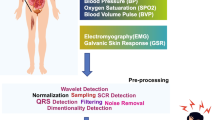Abstract
Health problems are rising with today’s stressful life, as it promotes cardiac diseases, depression, violence, and may provoke suicide. Hence, it is essential to develop a computer-aided diagnosis system to identify relaxed versus stressed individuals and their correct classification. Heart rate variability (HRV) based on RR interval is a well-proven clinical and diagnostic tool strongly associated with the autonomic nervous system (ANS). In this study, a conventional method was compared with a deep learning-based method. In the Conventional method, features were extracted from various domains, and these features were fed to a classifier to detect stressed states. However, this method uses hand-crafted features, and hence, there is a possibility of missed high potential features that may be responsible for maximizing the classifier’s generalization performance. This work presents a new approach motivated by the long short-term memory network (LSTM) in sequence learning to generate a concrete decision about the signal category. We proposed deep learning-based Inception-LSTM network to improve performance and to reduce computational cost. Two different stress datasets, viz., self-generated stress data and Physionet driver stress data were used to perform the proposed method’s performance analysis. The presented Inception-LSTM architecture outperforms existing literature methods, achieving an accuracy of 93% for self-generated stress data and 97.19% for driver stress data.
Access this chapter
Tax calculation will be finalised at checkout
Purchases are for personal use only
Similar content being viewed by others
References
Acharya, U.R., Joseph, et al.: Heart rate variability: a review. Med. Biol. Eng. Comput, 44(12), 1031–1051 (2006)
Camm, A.J., Malik, M., et al.: Heart rate variability: standards of measurement, physiological interpretation and clinical use. In: Task Force of the European Society of Cardiology and the North American Society of Pacing and Electrophysiology, pp. 1043–1065 (1996)
Delaney, J.P.A., et al.: Effects of short-term psychological stress on the time and frequency domains of heart-rate variability. Percept. Motor Skills 91(2), 515–524 (2000)
Han, S.-Y., Kwak, N.-S., et al.: Classification of pilots’ mental states using a multimodal deep learning network. Biocybern. Biomed. Eng. 40(1), 324–336 (2020)
He, J., Li, K., Liao, X., Zhang, P., Jiang, N.: Real-time detection of acute cognitive stress using a convolutional neural network from electrocardiographic signal. IEEE Access 7, 42710–42717 (2019)
Hochreiter, S., Schmidhuber, J.: Long short-term memory. Neural Comput. 9(8), 1735–1780 (1997)
Hoshi, R.A., Pastre, C.M., et al.: Poincaréplot indexes of heart rate variability: relationships with other nonlinear variables. Auton. Neurosci. 177(2), 271–274 (2013)
Oskooei, A., Chau, S.M., et al.: DeStress: Deep Learning for Unsupervised Identification of Mental Stress in Firefighters from Heart-rate Variability (HRV) Data. arXiv preprint arXiv:1911.13213 (2019)
Pan, J., Tompkins, W.J.: A real-time QRS detection algorithm. IEEE Trans. Biomed. Eng. 32(3), 230–236 (1985)
Ramteke, R., Thool, V.R..: Stress detection of students at academic level from heart rate variability. In: 2017 International Conference on Energy, Communication, Data Analytics and Soft Computing (ICECDS), pp. 2154–2157. IEEE (2017)
Rastgoo, M.N., et al.: Automatic driver stress level classification using multimodal deep learning. Expert Syst. Appl. 138, 112793 (2019)
Reijmerink, I., et al.: Heart rate variability as a measure of mental stress in surgery: a systematic review. Int. Arch. Occup. Environ. Health 1–17 (2020)
Rigas, G., et al.: Real-time driver’s stress event detection. IEEE Trans. Intell. Transp. Syst. 13(1), 221–234 (2011)
Seo, W., Kim, N., Kim, S., et al.: Deep ECG-respiration network (DeepER net) for recognizing mental stress. Sensors 19(13), 3021 (2019)
Szegedy, C., Vanhoucke, et al.: Rethinking the inception architecture for computer vision. In Proceedings of the IEEE Conference on Computer Vision and Pattern Recognition, pp. 2818–2826 (2016)
Tanev, G., et al.: Classification of acute stress using linear and non-linear heart rate variability analysis derived from sternal ECG. In: 2014 36th Annual International Conference of the IEEE Engineering in Medicine and Biology Society, pp. 3386–3389. IEEE (2014)
Wang, J.-S., et al.: A k-nearest-neighbor classifier with heart rate variability feature-based transformation algorithm for driving stress recognition. Neurocomputing 116, 136–143 (2013)
The Science of Stress. https://www.slma.cc/the-science-of-stress/. Last accessed 20 Aug 2020
PhysioBank Databases. https://archive.physionet.org/physiobank/database/. Last accessed 15 Nov 2020
Author information
Authors and Affiliations
Editor information
Editors and Affiliations
Rights and permissions
Copyright information
© 2022 The Author(s), under exclusive license to Springer Nature Singapore Pte Ltd.
About this paper
Cite this paper
Ramteke, R.B., Thool, V.R. (2022). Heart Rate Variability-Based Mental Stress Detection Using Deep Learning Approach. In: Iyer, B., Ghosh, D., Balas, V.E. (eds) Applied Information Processing Systems . Advances in Intelligent Systems and Computing, vol 1354. Springer, Singapore. https://doi.org/10.1007/978-981-16-2008-9_5
Download citation
DOI: https://doi.org/10.1007/978-981-16-2008-9_5
Published:
Publisher Name: Springer, Singapore
Print ISBN: 978-981-16-2007-2
Online ISBN: 978-981-16-2008-9
eBook Packages: Intelligent Technologies and RoboticsIntelligent Technologies and Robotics (R0)




